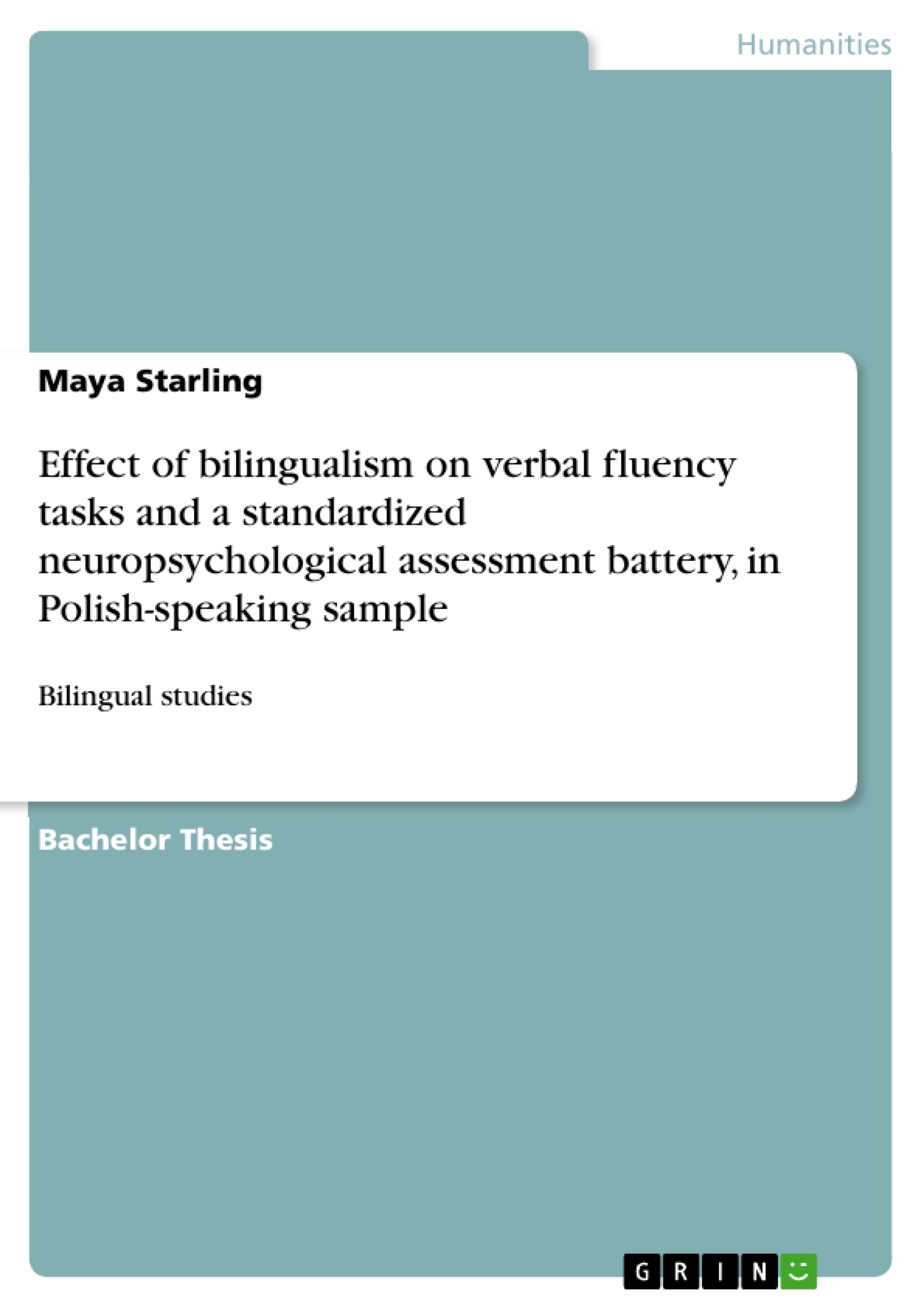20 monolingual (Polish) and 20 bilingual (Polish- English) speakers were employed to this study in attempt to establish a set of performance norms for a neuropsychological test battery. Participants were administered a number of cognitive test that resulted in no consistent differences between above language groups. Despite a small sample size, the data obtained could be considered a useful tool for clinicians working with Polish speakers.
The second objective was to determine the effect of bilingualism on Verbal Fluency tasks. It was hypothesized that Polish bilinguals would obtain lower scores than Polish monolinguals on above tasks. The groups comprised 40 participants who took part in the first part of the study. They completed 2 letter, 2 semantic and 1 category switching tasks. The analysis of collected data supported the main prediction that there is significant difference between the numbers of words produced by language groups. However the interaction did not reach significance. Further studies are needed in order to facilitate recent findings.
Inhaltsverzeichnis (Table of Contents)
- Introduction
- The Importance of a Standardized Neuropsychological Test
- Cross-Cultural Issues in Neuropsychological Assessment
- The Influence of Language on Cognition
- Cultural Biases in Cognitive Performance
- The Need for Cross-Cultural Neuropsychological Research
Zielsetzung und Themenschwerpunkte (Objectives and Key Themes)
This study aims to establish normative data for a brief neuropsychological test battery in Polish native speakers, addressing the lack of culturally sensitive assessments for Polish populations. The study also investigates the impact of bilingualism on verbal fluency tasks. Key themes explored include:- The importance of culturally sensitive neuropsychological assessments
- The influence of language on cognitive processes
- The impact of bilingualism on verbal fluency
- The need for cross-cultural research in neuropsychology
- The development of culturally appropriate standardized tests
Zusammenfassung der Kapitel (Chapter Summaries)
- Introduction: This chapter provides an overview of clinical neuropsychology, highlighting its focus on understanding the relationship between brain structure and function, and psychological processes. It introduces the concept of a neuropsychological test battery and its use in assessing cognitive abilities, emphasizing the importance of standardization and normative data.
- The Importance of a Standardized Neuropsychological Test: This chapter discusses the significance of standardized neuropsychological tests in the accurate assessment of brain dysfunction and the development of appropriate treatment plans. It also addresses the historical perspective on cognitive abilities, tracing the shift from the universalist view to the recognition of cross-cultural variations.
- Cross-Cultural Issues in Neuropsychological Assessment: This chapter explores the growing debate regarding the need for cross-cultural sensitivity in neuropsychological assessment. It raises the question of whether cognitive abilities are truly universal or influenced by cultural and social factors. The chapter emphasizes the importance of developing assessments that reflect cultural diversity and avoid biases.
- The Influence of Language on Cognition: This chapter examines the influence of language on cognitive processes, drawing on the theories of Benjamin Lee Whorf and Lev Vygotsky. It presents evidence from studies that suggest language shapes the way individuals perceive and remember, highlighting the role of language in the development of cognitive abilities.
- Cultural Biases in Cognitive Performance: This chapter reviews research that demonstrates the presence of cultural biases in cognitive performance. It explores how cultural practices and social systems influence thinking styles and cognitive processes, highlighting the need for culturally sensitive assessments.
Schlüsselwörter (Keywords)
This study focuses on the crucial areas of cross-cultural neuropsychology, bilingualism, and verbal fluency. Key concepts include culturally sensitive assessments, normative data, standardized tests, cognitive processes, and the influence of language on cognition.Frequently Asked Questions
How does bilingualism affect verbal fluency in Polish speakers?
The study found a significant difference in the number of words produced, with bilinguals often scoring differently on letter, semantic, and category switching tasks compared to monolinguals.
Why is culturally sensitive neuropsychological assessment important?
Standardized tests often have cultural biases; developing norms specifically for Polish speakers helps avoid misdiagnosis and ensures more accurate treatment plans.
What cognitive theories are discussed regarding language?
The research draws on theories by Benjamin Lee Whorf and Lev Vygotsky, which suggest that language shapes how individuals perceive, remember, and develop cognitive abilities.
What was the sample size of the study?
The study employed 40 participants: 20 monolingual Polish speakers and 20 bilingual Polish-English speakers.
What is a neuropsychological test battery?
It is a set of cognitive tests used to assess various brain functions and psychological processes to identify potential dysfunctions.
- Quote paper
- Maya Starling (Author), 2007, Effect of bilingualism on verbal fluency tasks and a standardized neuropsychological assessment battery, in Polish-speaking sample, Munich, GRIN Verlag, https://www.grin.com/document/265428



